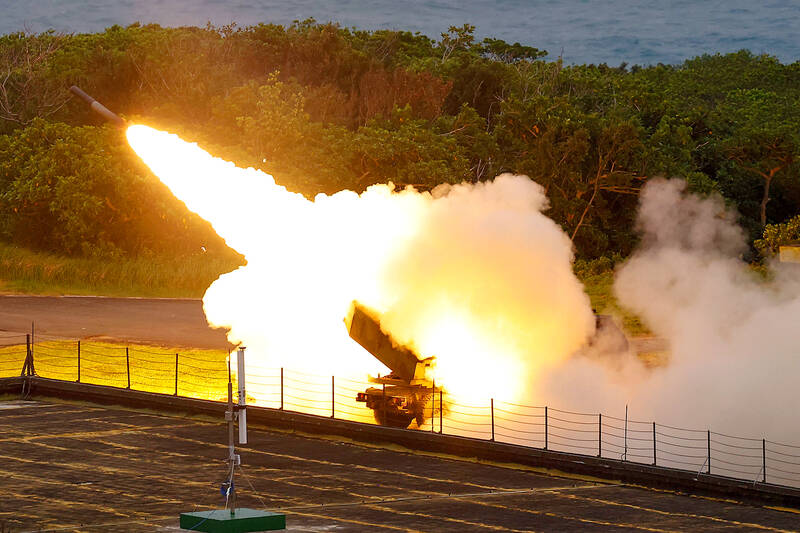The military yesterday conducted its first live-firing of High Mobility Artillery Rocket Systems (HIMARS) purchased from the US, as the nation upgrades its capabilities to repel a potential Chinese attack.
The US is Taiwan’s most important arms supplier, despite the lack of formal diplomatic ties.
Taiwan has faced increased military pressure from China, including several rounds of war games, as Beijing seeks to assert its sovereignty claims over the nation.

Photo: Ann Wang, Reuters
Taiwan has bought 29 of Lockheed Martin’s HIMARS, with the first batch of 11 received last year and the rest set to arrive by next year.
The truck-mounted units can launch multiple precision-guided rockets and have been used by Ukraine against Russia in their ongoing conflict.
With a range of about 300km, they could hit coastal targets in China’s Fujian Province, on the other side of the Taiwan Strait, in the event of a conflict.
Reporters watched yesterday as the army launched rockets from the HIMARS at Jiupeng base in Pingtung County.
Colonel Ho Chih-chung (何至中) told reporters that US technical personnel were present during the live-fire drill and helped to resolve a “signal error” during the first round when three launchers failed to fire simultaneously.
“We believe this exercise provides an opportunity to enhance our troubleshooting capabilities, allowing us to better demonstrate realistic combat readiness in the event of war,” Ho said.
Chinese-language Asia-Pacific Defense magazine editor-in-chief Cheng Chi-wen (鄭繼文), a military expert who attended the drill, said that HIMARS has gained international prestige during the Russia-Ukraine war.
Its overall performance is better than the locally made Thunderbolt-2000 multiple launch rocket system, as the GPS-aided navigation system provides HIMARS with powerful and precise attack capabilities, he said.
Given the HIMARS’ superior performance, the Chungshan Institute of Science and Technology would be advised to unify its ammunition with that of the Thunderbolt-2000, Cheng said.
It would help the army map out a stronger asymmetric warfare strategy, if HIMARS’ GPS-aided navigation technology can be applied to locally made weapons’ fire control systems to facilitate information sharing between both systems, he said.
Yesterday’s test came a day after Taiwan said it had detected another “joint combat readiness patrol” by China’s military near Taiwan involving warplanes and warships.
Additional reporting by Chen Chih-cheng

The Taiwanese passport ranked 33rd in a global listing of passports by convenience this month, rising three places from last month’s ranking, but matching its position in January last year. The Henley Passport Index, an international ranking of passports by the number of designations its holder can travel to without a visa, showed that the Taiwan passport enables holders to travel to 139 countries and territories without a visa. Singapore’s passport was ranked the most powerful with visa-free access to 192 destinations out of 227, according to the index published on Tuesday by UK-based migration investment consultancy firm Henley and Partners. Japan’s and

NATIONAL SECURITY THREAT: An official said that Guan Guan’s comments had gone beyond the threshold of free speech, as she advocated for the destruction of the ROC China-born media influencer Guan Guan’s (關關) residency permit has been revoked for repeatedly posting pro-China content that threatens national security, the National Immigration Agency said yesterday. Guan Guan has said many controversial things in her videos posted to Douyin (抖音), including “the red flag will soon be painted all over Taiwan” and “Taiwan is an inseparable part of China,” while expressing hope for expedited “reunification.” The agency received multiple reports alleging that Guan Guan had advocated for armed reunification last year. After investigating, the agency last month issued a notice requiring her to appear and account for her actions. Guan Guan appeared as required,

Japan and the Philippines yesterday signed a defense pact that would allow the tax-free provision of ammunition, fuel, food and other necessities when their forces stage joint training to boost deterrence against China’s growing aggression in the region and to bolster their preparation for natural disasters. Japan has faced increasing political, trade and security tensions with China, which was angered by Japanese Prime Minister Sanae Takaichi’s remark that a Chinese attack on Taiwan would be a survival-threatening situation for Japan, triggering a military response. Japan and the Philippines have also had separate territorial conflicts with Beijing in the East and South China

A strong cold air mass is expected to arrive tonight, bringing a change in weather and a drop in temperature, the Central Weather Administration (CWA) said. The coldest time would be early on Thursday morning, with temperatures in some areas dipping as low as 8°C, it said. Daytime highs yesterday were 22°C to 24°C in northern and eastern Taiwan, and about 25°C to 28°C in the central and southern regions, it said. However, nighttime lows would dip to about 15°C to 16°C in central and northern Taiwan as well as the northeast, and 17°C to 19°C elsewhere, it said. Tropical Storm Nokaen, currently